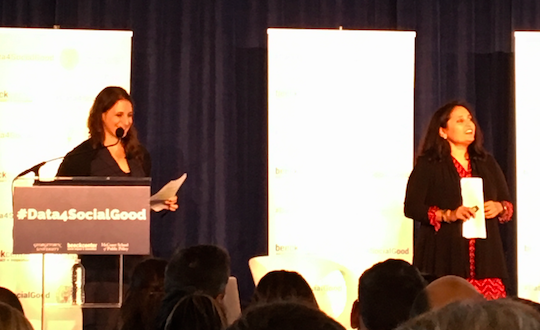Today I sat with some of the biggest brains in data science at a conference called #Data4SocialGood, that was co-hosted by Georgetown’s Massive Data Institute and Beeck Center for Social Impact & Innovation. What I heard today is truly worth sharing, and more importantly, worth reading. The ideas articulated by the impressive lineup of speakers are not only interesting and eye-opening, but are completely necessary to the positive progression of human existence. But more on that momentarily…
As we’ve spoken about before, data is available for essentially everything these days, but in this post I am not talking about the data behind your social media accounts or your website’s Google Analytics. This is much bigger…
We’re talking about mobilizing data for social good. Everywhere.
1. Why should YOU care about harnessing data for social good?
If you’re still reading, you are likely a changemaker or someone who is passionate about the idea of change for social good. Someone whose daily routine somehow ties back to improving the status quo. So, imagine that there is a ton of detailed data available for many of the most pressing problems of our times: unemployment, homelessness, prisons, skyrocketing traffic fatalities, etc. Sounds like a great resource we should be using right?
2. Then what’s the issue? Let’s just use the data.
Unfortunately it’s not that simple. Data hasn’t yet become scalable, meaning it oftentimes gets stuck in its own wheelhouses, within its own states, and within its own organizations. It isn’t shared on the type of level we need it to be in order for it to be used for solving many of today’s issues. Data needs to be accessible and adaptable for everyone. Even down to people like you and me.
DJ Patil, United States Chief Data Scientist, says the answer to this lies in groups of people that will need to be formed with the sole purpose of working towards liberating and scaling data on a national and international level. He articulated that,
“We have to create groups to work against the roadblocks. They can take on the additional vertices and scale the data.”
These groups, added William D. Eggers, Executive Director at Deloitte Center for Government Insight, will need to work with Congress to move faster with the data in order for it to become a viable solution.
3. So, what can you do on an individual level?
If you value social good and social change and you plan to vote for our next president, then I can’t think of a better thing you can do than to cast your ballot for a president that honors the power of data, plans to use it and includes it as a part of their platform. Patil reminded the audience today that “At the end of the day it’s about the people. It’s the people that establish a movement.”
Final Thoughts…
With that, I challenge you to become a part of the movement. Don’t skip out. Be a thinker. Be a mover. Be a changemaker.
If you’re feeling as fired up and excited about this as we are at Creative Science Labs, tweet at us at @creativesci and let us know your thoughts, or leave a comment below. The first step to accomplishing change is by participating in the dialogue.
